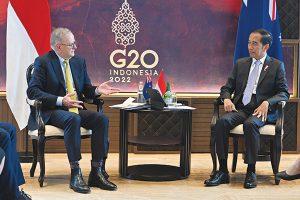The Group of 20 countries meet in Bali against the backdrop of heightened tension between the world’s great powers, nuclear threats and a looming global recession. With his military campaign in Ukraine faltering, Russia’s Vladimir Putin will be absent. A joint statement is unlikely, a significant breakthrough to solve concurrent crises in energy, climate and food would be a miracle.
But in 2022, the bar is low. Talk is already progress.
The G-20 has often swapped meaningful action for grandiose words in recent years, but the gatherings remain an opportunity for formal and informal diplomatic activity. That has rarely mattered more than this year, when communication among some leading players has been scarce, and deterioration of relations swift. The opportunity for Chinese leader Xi Jinping to meet his US counterpart for the first time since Joe Biden became president — Xi’s pandemic isolation lasted until September — is no small deal. Even without real concessions from either side, a tete-a-tete would be a rare chance to steady relations and, in the words of US officials, to build a floor.
Granted, the context is not propitious. Indonesia, the host nation, had no doubt hoped this November summit would cement its position in the global order and President Joko Widodo’s legacy as a statesman. That optimism was dashed the moment Putin invaded his neighbor, and the picture has worsened with every passing month, as the economic fallout expanded. Jokowi got a measure of the challenge with his visit to Kyiv and Moscow over the summer, when he offered to act as intermediary and sought grain and fertilizer promises, but left with little to show for his trouble. No wonder ambitions have been toned down.
The official G-20 theme remains “Recover Together, Recover Stronger,†but the world economy faces rising prices and worsening real incomes, while concurrent crises are deepening geopolitical fault lines. Domestic distractions abound for most of the participants, from fiscal woes to a bruising election cycle in Brazil or, for Japan and South Korea’s leaders in particular, dismal ratings.
The G-20 has been a victim of its own unwieldy structure for some time, of its wide reach and broad aims — problems dating back to Russia’s annexation of Crimea and former US President Donald Trump’s confrontational approach, but made worse by this year’s war, which saw the collective West unite behind Ukraine, but not the Global South, often suspicious of US motives and unwilling to antagonize Russia.
The saving grace for Jakarta is that Putin will not come. His presence, in theory, might have made breakthroughs possible, but it would almost certainly have brought about a repeat of the disruptive walkouts seen elsewhere this year, even if Ukrainian President Volodymyr Zelenskiy, invited by Jokowi, did not attend in person. There are inconvenient questions about Moscow’s continued membership, and divisions over Russia are looming over the summit, but remote attendance should at least lower the heat.
More credible expectations for progress lie in the sidelines, including with the in-person encounter between Xi and Biden. The hope, as political scientist Ja Ian Chong of the National University of Singapore put it to me, is that each would gauge the other’s position on key issues, helping to avoid miscalculation. That the chemistry is expected to work. Never mind that that spectacular success is almost impossible.
The two met after major domestic political hurdles have been cleared, with Xi endorsed for a precedent-breaking third term at the party congress and Biden coming through the US midterm elections with one of the best performances for an incumbent’s party in years. And yet, the problems at hand remain intractable. China has cranked up pressure on Taiwan since the visit by US House Speaker Nancy Pelosi in August, and the trade rupture has deepened, with the US imposing new restrictions on the sale of advanced chips. Xi is leaning more heavily on nationalism as a supporting pillar, while Biden has hawks on either side of the aisle.
Domestic politics means room for maneuver is, for both men, limited. But at this point — after China cut off conversations even on issues like criminal investigations and climate after Pelosi’s trip — it was about finding room for something other than escalation.
The G-20 may be less than the sum of its parts, and yet, as James Crabtree of the International Institute for Strategic Studies notes, the sum of those parts has significance.
Because it’s not just the Xi and Biden conversation that matters: it’s Xi and Australian Prime Minister Anthony Albanese and multiple other potential combinations of world leaders.
—Bloomberg
Clara Ferreira Marques is a Bloomberg Opinion columnist and editorial board member covering foreign affairs and climate. Previously, she worked for Reuters in Hong Kong, Singapore, India, the U.K., Italy and Russia.
 The Gulf Time Newspaper One of the finest business newspapers in the UAE brought to you by our professional writers and editors.
The Gulf Time Newspaper One of the finest business newspapers in the UAE brought to you by our professional writers and editors.

